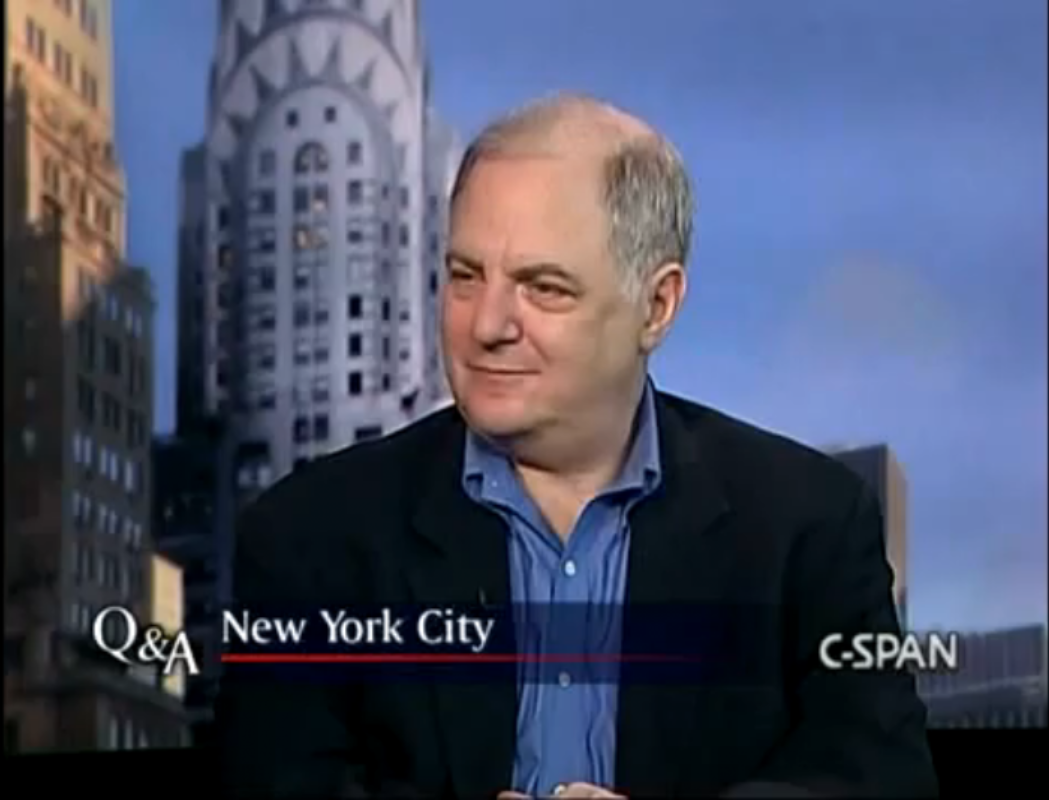(The Verge) – It is a seemingly cold, damp night in New York City, circa early 1990s. Draped in a trench coat and carrying a notepad, “The Butcher” enters his domain, the theater, where he would be merciless in his actions and compile something that could make or break million-dollar productions. This man, was theater critic for the New York Times, Frank Rich, or as he commonly became known twenty years ago, “The Butcher of Broadway.”
Rich was born in 1949 and grew up in Washington D.C. Eventually, he attended Harvard College and became their daily publication’s editor. After college, he served as a film critic for Time and the New York Post, and even as senior editor for New Times Magazine.
But in 1980, he moved onto the industry’s mainstay, the New York Times. Here he served as the publication’s chief theater critic for years, in a time when Broadway was going through massive upheavals and trying to clean its act. The streets were dirty and the plays (as some of Rich’s writing indicate), were scarcely iconic and even lackadaisical.

Developing a distinguishable voice in his writing, he began to obtain a fairly large following. People began counting on the critic’s opinions and he even began to determine the plight of certain shows. According to everything2.com, Rich is “best remembered for slashing musicals like Andrew Lloyd Webber’s Starlight Express, (calling it) ‘A confusing jamboree of piercing noise, routine roller-skating, misogyny and Orwellian special effects.’”
In an early 1990s 60 Minutes piece, Rich was profiled as the man who would singlehandedly break apart the aura of Broadway. But Rich, a self-proclaimed ‘simple man,’ had no intentions of singling out any major theater player. He was simply observing the most current productions, labeling them with well-deserved, fair and balanced reviews.
Andrew Lloyd Webber was not finished with Rich’s hasty proclamations, as he even called out the Phantom of the Opera a boxed, predictable production with deplorable acting. (I’m sure millions would suggest otherwise…)
Simply put, instrumental Broadway figures began a witch hunt against Rich, calling him “The Butcher” and saying his overarching intentions were to just spoil the works of people who’d dedicated years to make a show. Sometimes, after a poor Times report by Rich, shows were thrust from the limelight and kicked to the curb…in just two days.
Producers began to hold their breath as the reviews came out, but Rich trudged forward, continuing to monitor what he saw was a changing time in on Broadway. It would be silly not to assume Rich wrote favorable reviews, because really, he did. CBS, in their slightly accusatory report, profiled the man as a heartless brut, but Rich made a career out of writing reviews that people actually did appreciate.
As head-honchos wanted his head, more and more people depended upon his writing. At that point, a crossroads had been met. One side had to budge, and the Times knew it. No longer could they send their butcher out into the heated jungle, because he was wholly changing the dynamic of theater.
So the Times dwelled and dwelled, and decided to do what any company would do once an employee comes under fire…
Promote him.
That’s right, taking a pay raise and a hefty leap over to the Op-Ed page, Rich became a chief columnist in the Sunday’s opinion section. Writing these Op-Ed pieces, he began to put forth much of his leftist ideologies, eventually coming to harshly criticize President George W. Bush, the GOP and even the insanity of the Democratic party at times.

So from 1994-2011, he spent his days putting together a unique perspective of the week’s cultural happenings. Becoming more and more political, he eventually began to represent the fearsome leftist “Manhattan liberalism.” Many loved it, some did not. Sound like a familiar trend? From time to time, Rich would even still dabble in theater and film, and he remains writing on the topics till this day.
But after a distinguished career at the Times, Rich left in 2011 to pursue a position as Editor-at-large of New York Magazine. Once there, he began his customary writing again, even throwing in his two cents recently on Django Unchained and Lincoln. On Django, according to his feature page, Rich narrated that the “film pushes so many hot buttons you can’t quite believe it was made.” Clearly, he’s still on his game…whether that comforts anyone, I can’t quite say.
But as The Butcher continues to push the envelope, write up stories on heated topics and ignore the flack that is drearily hazing over him, more and more people are appreciating his work. As a more middle-leaning political mind, I still appreciate the voice and input of the man who once storm-trooped Broadway by himself. I just hope The Butcher doesn’t want to make minced meat out of me because I gave an extra star to a movie that hardly deserved it…




